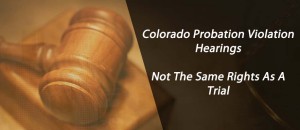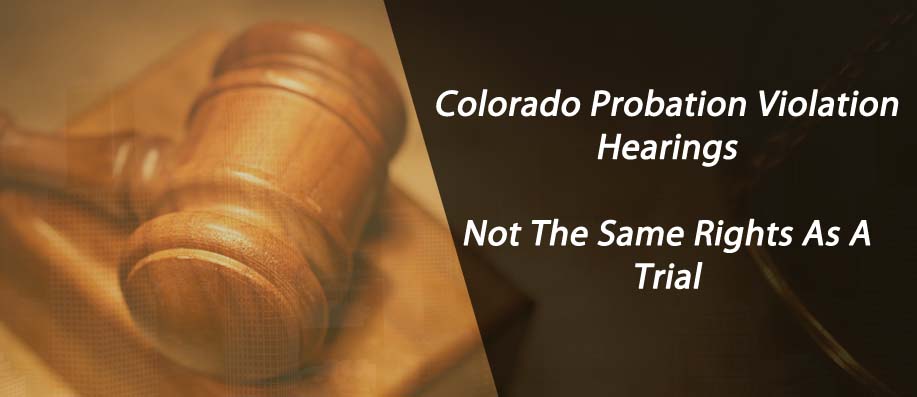




Colorado Probation Violation Hearings – Not The Same Rights As A Trial
By H. Michael Steinberg Colorado Probation Violation Criminal Defense Lawyer – Attorney
 Colorado Probation Violation Hearings – Not The Same Rights As A Trial – It comes as a surprise to many Colorado Defendants on probation that, when and if, they are facing a complaint to violate (revoke) their probation sentence – the rights of those “probationers” are greatly reduced at the probation violation hearing.
Colorado Probation Violation Hearings – Not The Same Rights As A Trial – It comes as a surprise to many Colorado Defendants on probation that, when and if, they are facing a complaint to violate (revoke) their probation sentence – the rights of those “probationers” are greatly reduced at the probation violation hearing.
One of the greatest possible losses to a person on a form of probation known as a deferred judgment and sentence – is when the that agreement is threated by a Colorado probation revocation proceeding.
The Colorado Deferred Judgment Law – 18-1.3-102
Colorado criminal law (§18-1.3-102) provides, if the parties agree, for a kind of contract labeled a deferred judgment and sentence. This unique “dispositional alternative” or plea bargain is very different than the traditional guilty plea agreement.
A deferred judgment and sentence works like this.. In exchange for a “continuance” of the case, the Defendant enters a conditional plea of guilty and then stipulates to “probation-like” conditions of supervision.
If the Defendant fully complies with the conditions of a Colorado deferred judgment agreement under 18-1.3-102, the previously entered guilty plea is withdrawn and the charges are dismissed with prejudice.
The Colorado deferred judgment law requires a written stipulation, signed by the prosecutor and the Defendant, setting the agreed upon conditions of the deferred judgment agreement.
“The purpose of the written stipulation is to ensure that the defendant knows prior to the entry of a guilty plea the consequences of violating the conditions of the deferred judgment and sentence.”
A deferred judgment and sentence agreement is a privilege, like probation, and not a right.
Like probation, a deferred judgment and sentence agreement may also be revoked. If that happens, the Judge enters a “judgment” – or conviction and may then impose any sentence on the Defendant’s previously entered guilty plea.
The revocation process for the revocation of a Deferred Judgment has the same procedural safeguards, (or lack of safeguards as discussed below) as a Defendant facing revocation of probation.
The Colorado Law That Provides For The Procedures Of A Colorado Probation Revocation Proceeding Is Found in Section 16-11-206
Section 16-11-206 sets the procedures at a probation revocation hearing.
At the time that a Colorado probationer is first arrested or first summoned and brought before the court – the Judge must advise the probationer that if he or she enters a guilty plea he or she waives (gives up) all other procedural rights.
If the probationer remains in custody, (does not post bond) the probation revocation hearing must be held within 14 days of the filing of the complaint.
At the probation revocation hearing The Colorado the probationer has the following “minimal” due process protections at the Colorado probation revocation hearing:
(1) written notice of the alleged probation violations;
(2) disclosure to the probationer of evidence against him;
(3) an opportunity to be heard in person;
(4) the right to confront and cross-examine adverse witnesses; and
(5) a written or oral statement on the record by the fact finder as to the evidence relied on and the reasons for revocation.
Missing Rights – Rights NOT Accorded To The Probationer At Colorado Probation Violation Hearings
Colorado courts have held that there are:
“critical differences between criminal trials and . . . revocation hearings,”
“[d]efendants in revocation proceedings are not entitled to the full range of constitutional guarantees afforded to defendants in criminal prosecutions,”
“[r]evocation deprives an individual, not of the absolute liberty to which every citizen is entitled, but only of the conditional liberty properly dependent on observance of special . . . restrictions.”
Because a revocation hearing is held for different purposes than a criminal trial, the rights extended to a probationer facing revocation are “significantly reduced” when compared to a defendant facing substantive criminal charges.
For example:
- A probationer has no right to a jury at a revocation proceeding § 16-11-206.
- A probationer cannot plead “not guilty by reason of insanity” at a revocation proceeding.
- A probationer has no right to a “Curtis advisement” on the right to testify.
- The Colorado Rules of Evidence are relaxed, and the Exclusionary Rule that results in the exclusion of evidence for illegally seized evidence by law enforcement (in the absence of extreme bad faith or egregious misconduct), does not apply.
- Statements obtained by law enforcement in violation of the probationer’s Miranda rights will most likely be admissible.
- A probationer’s assertion of the right to remain silent or to a lawyer under the Fifth and Sixth Amendments – by refusing to answer specific questions may be used against him or her at the probation revocation hearing.
Understanding The Differences Between A Trial And A Probation Revocation Hearing
To understand the critical differences between a criminal trial and a probation revocation proceeding, one needs to look at the phase that a case has reached in the timeline that is the Colorado criminal justice system.
The accused at a criminal trial is presumed innocent and the purpose of the trial to is determine the very issue of guilt. Therefore the “full array of constitutional protections” apply at this early stage of the proceeding.
At a probation revocation proceeding the conduct of the Defendant is “post adjudication of guilt.” Guilt has already been determined. At a Colorado probation revocation proceeding – “complete and reliable information” about the Defendant’s conduct is deemed essential to a finding of responsibility for a violation of the conditions of probation.
In fact, Judges typiclaly ask the probationer not whether they plead guilty or not guilty but do they “admit” the alleged violation or violations of the complaint to revoke probation at the revocation proceeding.
Section 16-11-206, the statute that establishes the procedure for a Colorado probation violation hearing provides for the admission of almost ANY evidence:
“[a]ny evidence having probative value should be received regardless of its admissibility under the exclusionary rules of evidence if the defendant is accorded a fair opportunity to rebut hearsay evidence.”
One Exception – One Limitation On The Governments’s Power – Egregious Misconduct
The Colorado Court’s Of Appeal have left one door slightly ajar on the exclusion of illegally seized evidence in Colorado probation violation investigations and prosecutions:
If it is demonstrated that law enforcement officers knowingly engaged in a pretext arrest and exploratory search of the defendant because of his probationary status, or otherwise pursued in bad faith a course of harassment or other form of gross impropriety, suppression of the fruits of that governmental activity would be both appropriate as a deterrent and necessary in the interest of judicial integrity.
In the absence of these or other forms of egregious misconduct, however, the exclusionary rule is inapplicable to probation revocation proceedings.
Summary and Conclusion – Colorado Probation Violation Hearings – Not The Same Rights As A Trial
An experienced Colorado criminal defense lawyer knows that upon a finding that a probationer has violated probation, the Judge must then determine:
“whether continuing probation is effective in rehabilitating the probationer or whether the probationer should be re-sentenced to confinement.”
To do that properly, the Judge must:
“balance the probationer’s interest in demonstrating a responsible lifestyle with society’s interest in seeking protection against the possibility of recidivism.”
The experienced Colorado criminal defense lawyer’s role is to assist the Judge – to persuade the Judge – that that balance should be struck on behalf of the Defendant and therefore to obtain the very best result under the circumstances of the individual case for the lawyer’s client.
Colorado Probation Violation Hearings – Not The Same Rights As A Trial
If you found any of the information I have provided on this web page article helpful please click my Plus+1 or the Share buttons for Twitter and Facebook below so that others may also find it.
If, after reading this article, you have questions about your case and would like to consider retaining our law firm, we invite you to contact us at the Steinberg Colorado Criminal Defense Law Firm – 303-627-7777.
Never stop fighting – never stop believing in yourself and your right to due process of law. You will not be alone in court, H. Michael at your side every step of the way – advocating for justice and the best possible result in your case.
 ABOUT THE AUTHOR: H. Michael Steinberg – Email The Author at [email protected] – A Denver Colorado Criminal Defense Lawyer – or call his office at 303-627-7777 during business hours – or call his cell if you cannot wait and need his immediate assistance – 720-220-2277. Attorney H. Michael Steinberg is passionate about criminal defense. His extensive knowledge and experience of Colorado Criminal Law gives him the edge you need to properly handle your case.
ABOUT THE AUTHOR: H. Michael Steinberg – Email The Author at [email protected] – A Denver Colorado Criminal Defense Lawyer – or call his office at 303-627-7777 during business hours – or call his cell if you cannot wait and need his immediate assistance – 720-220-2277. Attorney H. Michael Steinberg is passionate about criminal defense. His extensive knowledge and experience of Colorado Criminal Law gives him the edge you need to properly handle your case.
“A good criminal defense lawyer is someone who devotes themselves to their client’s case from beginning to end, always realizing that this case is the most important thing in that client’s life.”
You should be careful to make a responsible choice in selecting a Colorado Criminal Defense Lawyer – and we encourage you to “vet” our firm. Over the last 40 plus years – by focusing ONLY on Colorado criminal law – H. Michael has had the necessary time to commit to the task of constantly updating himself on nearly every area of criminal law, to include Colorado criminal law and procedure and trial and courtroom practice. H. Michael works hard to get his clients the best possible results in and out of the courtroom. He has written, and continues to write, extensively on Colorado criminal law and he hopes this article helps you in some small way – Colorado Probation Violation Hearings – Not The Same Rights As A Trial.

Other Articles of Interest:
- Can Illegally Obtained Evidence Be Used In Colorado Probation Violation Hearings Under 16-11-206?
- The How & Why Of Colorado Probation Violations Are Prosecuted
- Colorado Probation Violation Law – New Criminal Charges As A Violation of Probation
- Understanding Probation Revocation Polcies In Colorado Probation Revocation Decision Making
- A Colorado Probation Violation Guide To Intelligently Defending Probation Violations












